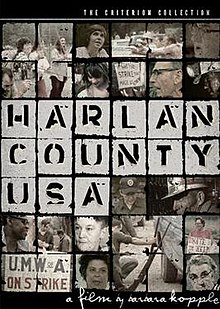Harlan County, USA
| Harlan County, USA | |
|---|---|

The Criterion Collection DVD cover
|
|
| Directed by | Barbara Kopple |
| Produced by | Barbara Kopple |
| Music by | Hazel Dickens Merle Travis David Morris |
| Cinematography | Kevin Keating Hart Perry Tom Hurwitz |
| Edited by | Nancy Baker Mary Lampson |
| Distributed by | First Run Features |
|
Release date
|
|
|
Running time
|
103 minutes |
| Country | United States |
| Language | English |
Harlan County, USA is a 1976 Oscar-winning documentary film covering the "Brookside Strike", an effort of 180 coal miners and their wives against the Duke Power Company-owned Eastover Coal Company's Brookside Mine and Prep Plant in Harlan County, southeast Kentucky in 1973. Directed and produced by Barbara Kopple, who has long been an advocate of workers' rights, Harlan County, U.S.A. is less ambivalent in its attitude toward unions than her later American Dream, the account of the Hormel Foods strike in Austin, Minnesota in 1985-86.
Kopple initially intended to make a film about Kenzie, Miners for Democracy and the attempt to unseat Tony Boyle. When miners at the Brookside Mine in Harlan County, Kentucky went on strike in June 1972, Kopple went there to film the strike against Duke Power Company which the UMWA had helped to organize. The strike proved a more interesting subject, so Kopple switched the focus of her film.
Kopple and her crew spent years with the families depicted in the film, documenting the dire straits they found themselves in while striking for safer working conditions, fair labor practices, and decent wages; following them to picket in front of the stock exchange in New York, filming interviews with people affected by black lung disease, and even catching miners being shot at while striking.
The most significant point of disagreement in the Harlan County strike was the company's insistence on including a no-strike clause in the contract. The miners were concerned that accepting such a provision in the agreement would limit their influence over local working conditions. The sticking point was mooted when, a few years after the strike, the UMWA folded the agreement that was eventually won by this group of workers into a global contract.
...
Wikipedia
